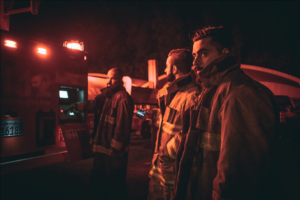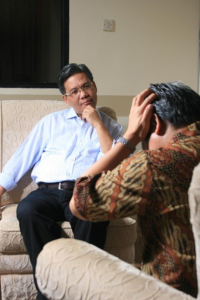
- admin
- May 13, 2020
- 12:03 pm
- No Comments
Overcoming A Firefighter’s Trauma
Firefighters are essential workers for the development of any country. They’re trained to respond to disasters, prevent damage, and, most importantly, save lives. They literally walk through fire for people who need them. Their resilience and bravery are why they deserve the utmost respect.
However, something that you might not know about is the impact of firefighting on mental health. Many firefighters have been dealing with trauma for years during their careers. When you go through something traumatic, and a firefighter comes to your help, they go through a similar traumatic response to you.
Many people in the force don’t know how to look out for signs that they’re dealing with traumatic stress. It’s also hard for people trained to be the saviors to reach out for help and admit that they’re not feeling great.
How Firefighting Can Cause Trauma
It can be hard to understand how firefighters can develop traumatic stress. Here’s how we can understand this. Known historically as shellshock, Post-Traumatic Stress Disorder (PTSD) was seen and diagnosed in soldiers as early as during World War I. Similarly, when firefighters are exposed to dangerous situations and upsetting incidents every day, they can develop PTSD in reaction to it.
- Recurring stressful memories of traumatic events
- Distressing nightmares
- Having flashbacks
- Severe emotional reactions to triggers that remind the person of their trauma
- Avoidance of their issues and refusal to talk about it
- Negative changes in mood
- Emotional numbness
- Self-destructive behavior
- Extreme guilt or shame
This is not a complete list by any means, which points to how serious this mental health concern is.
Why It’s Necessary To Address Firefighting Trauma
There’s tons of evidence to support the idea that we need to be concerned about the mental wellbeing of our emergency responders. The US Fire Administration Department reported in August 2019 that rates for suicide in the firefighting force were significantly higher.
 Research shows that firefighters (and police officers) were more likely to die by suicide than by job-related incidents. On top of this, PTSD can lead to other mental health issues such as depression and generalized anxiety. Firefighters are also more likely to suffer from alcoholism or different kinds of substance abuse disorders to cope with their trauma.
Research shows that firefighters (and police officers) were more likely to die by suicide than by job-related incidents. On top of this, PTSD can lead to other mental health issues such as depression and generalized anxiety. Firefighters are also more likely to suffer from alcoholism or different kinds of substance abuse disorders to cope with their trauma.
It’s not just about death or debilitating mental illness. Even when mental health issues aren’t as obvious, their existence can impair judgment skills. A firefighter needs to be feeling stable and calm to do their job. If they aren’t at their best, they could make decisions that can endanger themselves, civilians, and their colleagues.
Taking Professional Help
When pa rticularly distressing events happen with firefighters in the field, the best way to accept help is to look for professional services. This can mean talking to an experienced psychologist who specializes in helping firefighters deal with their trauma.
rticularly distressing events happen with firefighters in the field, the best way to accept help is to look for professional services. This can mean talking to an experienced psychologist who specializes in helping firefighters deal with their trauma.
If you have PTSD, you must talk with someone who knows how to deal with PTSD because therapy works in different ways for different kinds of issues. Cognitive-behavioral therapy has been shown to work with consistent sessions. Techniques such as prolonged exposure to triggers in a safe environment, stress inoculation training, and cognitive processing therapy are useful for PTSD.
Depending on what other kinds of mental health concerns have developed alongside the PTSD, therapists can employ a range of treatments and techniques to help their patients. Medication or twelve-step programs can also be recommended to boost progress in dealing with these issues.
Mindfulness as a Lifestyle for PTSD
Once firefighters go through the process of dealing with the deep-rooted emotions that are often at the core of PTSD, their progress must stay at the same level. However, once firefighters go back to work, they’re being exposed to the same kinds of events that caused traumatic stress in the first place.
Recent developments in mental healthcare have discovered the efficacy of mindfulness as a way to deal with mental health. Mindfulness is not a cure, but a tool to cope with the daily struggles people with PTSD can face.
 Mindfulness works by focusing on your own body and emotions in the present as a tool to regulate stress reactions or depressive moods. Meditation, deep breathing, and body scans are all part of getting to a point where people can acknowledge their state of mind and body.
Mindfulness works by focusing on your own body and emotions in the present as a tool to regulate stress reactions or depressive moods. Meditation, deep breathing, and body scans are all part of getting to a point where people can acknowledge their state of mind and body.
The idea is that through calming and self-awareness methods, people having PTSD symptoms such as flashbacks can become tuned to their inner and outer realities. These techniques can be incredibly useful for firefighters who are struggling with debilitating symptoms of PTSD.
Research has shown that areas of the brain affected by PTSD can be healed using mindfulness techniques. However, professionals must supervise this process, or the effects may be limited.
Why Mental Healthcare is an Essential Firefighting Skill
When preparing for firefighter exams, applicants are taught all kinds of skills. At Civil Service Success, our experienced instructors will help you learn how to prepare for the New York test and a career in firefighting. This includes techniques for putting out fires, dealing with chemical and biological threats, enforcing safety standards, and rescuing people.
 When we hire retired officers to prepare applicants for the civil service exams or the Suffolk County police tests, it is with the intention that they have value-added wisdom to teach you. (You can register for them on our website.) Take these moments to ask the retired firefighters instructing you to ask them what it’s like on the job from a mental health perspective.
When we hire retired officers to prepare applicants for the civil service exams or the Suffolk County police tests, it is with the intention that they have value-added wisdom to teach you. (You can register for them on our website.) Take these moments to ask the retired firefighters instructing you to ask them what it’s like on the job from a mental health perspective.
As more research and anecdotal evidence comes forward about the effects of the work, fire departments have recognized that learning about mental health is just as important.
How the New York Fire Department Helps Its Employees
The Fire Department of New York (FDNY) has been quick on its heels in making sure that adequate mental health support is available for their officers. They have a Counseling Services Unit (CSU) set up for this exact purpose. The CSU offers services to all kinds of FDNY employees, even retired officers. They help people access the right type of therapy for their unique set of issues.
Another program that the FDNY has spearheaded is the peer counseling program. This program works by having peers visit fire stations and conducting one-to-one conversations with active officers. This aids the process of catharsis as well as acknowledging that something is going wrong. Talking to someone who’s been exactly where they are can be more helpful than a professional sometimes.
As time goes by, let’s hope that these issues are more visible, and our heroes don’t have to suffer in silence anymore.

